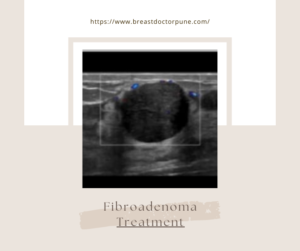Fibroadenoma is a solid and benign (non-cancerous) breast lump common in women. They may get smaller or bigger at a time or disappear completely. These rounded and solid tumours contain glandular and fibrous tissue that forms a mass. Some of them are so small that they can’t be felt. These tumours are small, firm, and smooth. These breast lumps can also move easily under the skin.
Fibroadenoma can be found in one or both breasts. These tumours are not life-threatening and rarely increase the risk of breast cancer. They are the most common type of benign breast tumour. These breast lumps can be found in women of any age. They are common in women aged between 15 to 35 years. These lumps shrink when women are in their menopause period. But some of these lumps get bigger during pregnancy..
There are mainly two types of fibroadenoma. These are:
- Simple – These small-sized breast tumours do not increase breast cancer risks.
- Complex – These complex tumours are large that contain calcifications and macrocysts. They increased the chances of breast cancer.
- Giant lumps: which are extending more than 4 cm in size.
- Phyllodes tumor: they can be benign, borderline or cancerous.
Fibroadenoma Symptoms
Some signs and symptoms indicate the presence of these breast lumps, which are as follows:
- Do not cause pain
- Are round and have smooth borders
- It can be moved easily
- Are rubbery or firm
- recently detected
These lumps grow slowly and can gain an average size of 2.5 centimetres (1 inch). Bigger breast tumours become painful and cause breast changes, also known as Giant lumps.
Fibroadenoma Problems
Generally, these lumps do not cause any problems, but some tumours may harm the patient’s body. If these tumours continue to grow, they may cause changes in the breasts. Hence, doctors advise removing them before they become large and notorious. Usually, these breast lumps do not cause cancer, but complex or lobulated ones increase the risk of developing breast cancer.
Fibroadenoma Risks
The following are some common risk factors :
- Being 35 years old or more (young age)
- Family history of non-cancerous breast diseases
- Prior history of several benign non cancerous lumps
- Obesity
- Consuming oral contraceptives before the age of 20 for some diseases like PCOD.
Why consult with Dr. Shilpy Dolas?
Dr Shilpy Dolas is a breast surgeon at Heart and Breast Care Clinic, Pune. She is an expert in treating all breast diseases. Dr Dolas graduated from Chaudhary Charan Singh University, Meerut, in 2005. She completed her post-graduation in General Surgery from D.Y.Patil Medical College, Pune, in 2007. remaining an extraordinary student, and her interest in research work made her surgeries more successful. Dr Dolas won many awards for breast diseases, minimally invasive breast surgeries, and congenital developmental breast surgeries and also got more than ten (10) national and international publications in famous journals. The services provided by her include breast cancer surgeries, breast reconstruction, breast reduction, breast screening, breast implants, biopsies, scarless breast lumps surgeries for fibroadenoma treatment, VAB ( Vaccum assisted Biopsy. She was the first lady breast surgeon in India to be awarded for doing successful VAB surgeries in 2012.), cosmetic breast surgeries, chemo port insertion, head and neck surgeries, hysterectomies and many more.
Patients with breast lumps are recommended to consult Dr Dolas, as she will help them to treat their diseases easily. She provides them with better and minimally invasive treatments. Dr Dolas communicates with her patients and guides them during the surgeries.
Clinic Centres
Heart and breast care clinic, plot no. 78/A next to Pune polymer house, near Magar stadium, Pimpri Colony, Pune.
FAQs
Q1. How can I prevent fibroadenomas?
Ans. Patients can do the following to prevent fibroadenomas:
- Consuming less alcohol
- Going through breast self-examinations
- Going for mammogram screenings
- Maintaining health by doing exercises and eating healthy food
Q2. What treatment will I get to cure my fibroadenomas?
Ans.Patients suffering from fibroadenomas often do not require any follow-up or treatment. Doctors may recommend some breast surgeries like ultrasound-guided minimally invasive scarless breast surgeries or vacuum-assisted excision biopsy in case of simple or complex fibroadenomas

